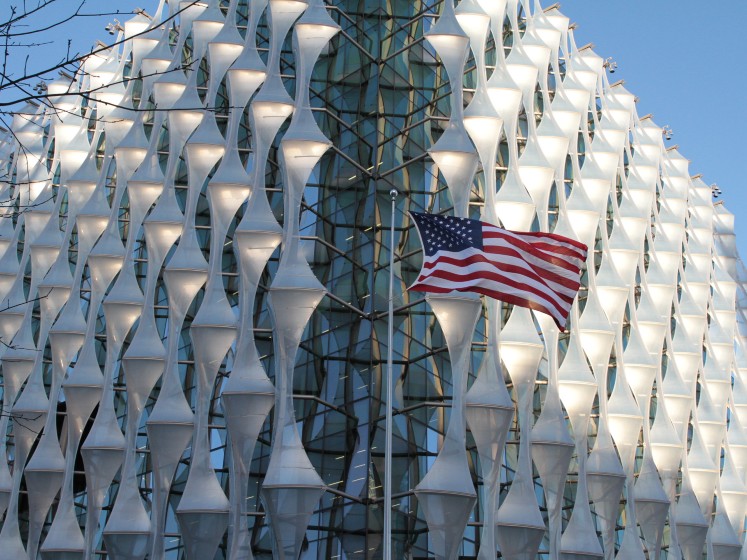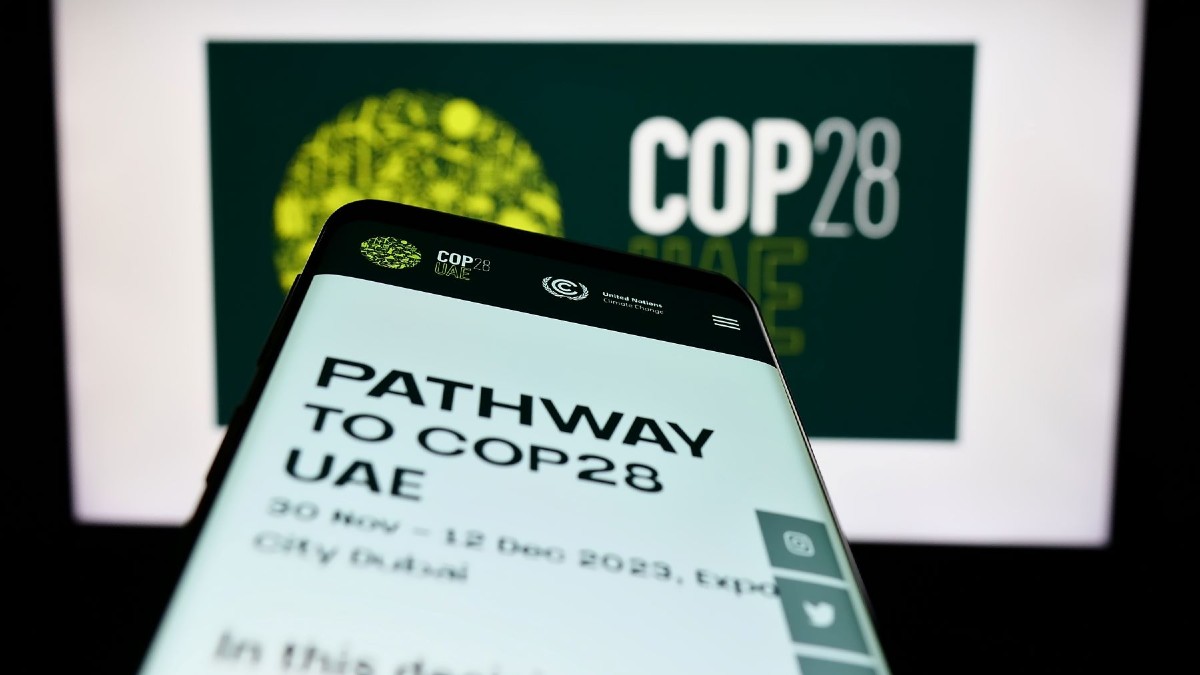In this report, we hear from Maria Beinborn, an MSc International Relations student at LSE, who was a participant in the 62nd Graduate Study Programme at the UN in Geneva in July 2024. This year’s participants are working to create a more inclusive and successful global governance framework by concentrating on AI and youth.

The participants of the 62nd Graduate Study Programme at the United Nations, Geneva, July 2024. Photo: © UN Photo / Peter Haechler
As the world contends with unprecedented challenges, the upcoming United Nations Summit of the Future promises to be an important milestone in global governance. Scheduled for September 2024, this summit aims to address the key issues and revitalise international collaboration — providing a hopeful prospect for collective international action.
This year’s 62nd Graduate Study Programme (GSP) at the Palais des Nations in Geneva set the stage for this impactful UN event. It brought together 60 graduate students and young researchers from over 45 countries to explore innovative solutions and promote global cooperation.
What is the Summit of the Future?
The Summit of the Future offers a rare, once-in-a-generation opportunity to revitalise global efforts and reimagine multilateral cooperation to tackle the most pressing global challenges. The UN Charter and the Sustainable Development Goals (SDGs) will be reinforced at this assembly. It will also create new frameworks to address current issues, including global inequality, digital transformation, and climate change. Key themes of the summit include reaffirming the UN Charter, reinvigorating multilateralism, boosting the implementation of existing commitments, agreeing on solutions to new challenges, and restoring trust in global governance. The goal of this summit is to create a future where everyone may live in dignity and equality.
Key themes of the summit include reaffirming the UN Charter, reinvigorating multilateralism, boosting the implementation of existing commitments, agreeing on solutions to new challenges, and restoring trust in global governance.
The role of the Graduate Study Programme
The Graduate Study Programme, the UN’s longest-running educational initiative, aims to inspire the next generation of decision-makers to take on global challenges. The theme for this year, Summit of the Future: Challenges and Opportunities, is especially relevant because it perfectly aligns with the goals of the upcoming conference.
This year’s agenda included interactive discussions from multiple UN agencies and organisations, presenting a variety of specialisations to provide in-depth knowledge of the subjects surrounding the Summit of the Future.
Highlights included a keynote speech on the journey to the Summit of the Future by Guy Ryder, the UN Under-Secretary-General for Policy, and a perceptive talk on AI’s influence on UN 2.0 presented by Jovan Kurbalija of the DiploFoundation. Along with Corinne Momal-Vanian from the Kofi Annan Foundation, participants also explored the role of youth in multilateralism.
Interactive working group sessions were at the heart of the programme, covering crucial topics such as global diplomacy for the planetary crisis led by Josep Garí from UNDP, gender equality spearheaded by Adriana Quiñones from UN Women, and climate change insights provided by Lauren Stuart from the WMO. Other significant contributions included discussions on digital inclusion by Sylvia Poll from ITU, human rights by Nada Al-Nashif from OHCHR, and peacebuilding strategies by Itonde Kakoma from Interpeace.
 The agenda included guided tours of the Palais des Nations, networking events with World Economic Forum Global Shapers, and collaborative projects. A reception at the residence of the Swiss Ambassador to the UN offered a unique opportunity for informal discussions. The programme culminated with working group presentations and a graduation ceremony with Tatiana Valovaya, Director-General of UN Geneva – and all of this highlights the multinational character of the United Nations.
The agenda included guided tours of the Palais des Nations, networking events with World Economic Forum Global Shapers, and collaborative projects. A reception at the residence of the Swiss Ambassador to the UN offered a unique opportunity for informal discussions. The programme culminated with working group presentations and a graduation ceremony with Tatiana Valovaya, Director-General of UN Geneva – and all of this highlights the multinational character of the United Nations.
The GSP offers an immersive experience, connecting future leaders with global experts and policymakers across various fields. By blending theoretical knowledge with practical skills from a wide array of UN institutions and agencies, the programme plays a crucial role in shaping a resilient, equitable, and sustainable world, driving forward the ambitious agenda of the Summit of the Future.
The GSP offers an immersive experience, connecting future leaders with global experts and policymakers across various fields.
Focus on AI and Youth: A driving force for change
In an era where technology shapes every aspect of our lives, this year’s Graduate Study Programme highlighted the transformative potential of artificial intelligence in addressing global challenges. The “Youth Shaping the Future of Science, Technology, and Education” working group, in partnership with the International Telecommunication Union (ITU) and led by Alexandra Bustos Iliescu from AI for Good, is at the forefront of harnessing AI for social good. Through a series of dynamic lectures and discussions, participants delved into critical topics like security governance, peacekeeping, and global health diplomacy, emphasising AI’s game-changing potential in these areas.
Hands-on collaborative projects were a key component, where students focused on practical AI applications in education, healthcare, and crisis management. These efforts aimed to draft impactful reports for the upcoming Summit of the Future, showcasing how AI can address regional challenges and promote social good. The committee identified resource gaps and accessibility challenges in order to successfully adapt their recommendations. To ensure inclusivity, they conducted an anonymous regional survey to obtain different input. By working together, we were able to demonstrate AI’s capacity to bring about a great deal of good while at the same time empowering a new generation of leaders with the skills and resources they need to create a progressive, more equal society.
By working together, we were able to demonstrate AI’s capacity to bring about a great deal of good while at the same time empowering a new generation of leaders with the skills and resources they need to create a progressive, more equal society.
Shaping a sustainable future
Young leaders have a unique opportunity to contribute to important global discussions and design policies that will impact the future through the UN Graduate Study Programme. This year’s participants are working to create a more inclusive and successful global governance framework by concentrating on AI and youth. Their innovative efforts and varied viewpoints are more than simply intellectual exercises; they are practical answers to urgent global issues.
As we look forward to the Summit of the Future in September 2024 in New York, the insights and contributions from these young minds will be invaluable. These young individuals are setting the movement to create a more equal and sustainable world — they are not merely participants in a programme. The policies and tactics that will direct us tomorrow are built upon the job they do now. We are taking a significant step toward a future where global government is not only more efficient but also more inclusive and just by embracing the promise of AI and the zeal of youth. The innovative concepts and solutions created via the GSP will surely enhance the Summit of the Future and we hope bring in a new age of just and sustainable development.
Banner photo © UN Photo / Peter Haechler
Passport photo by Omer Malikyar
Featured photo of UN by Maria Beinborn
This article represents the views of the author, and not the position of the Department of International Relations, nor of the London School of Economics.





